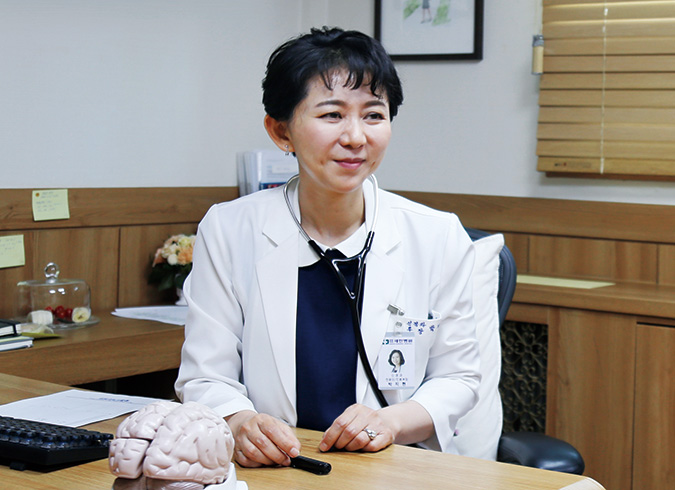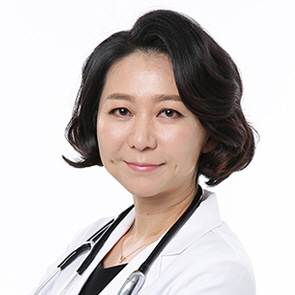
To the only dizziness rehabilitation center in Korea We're going to conduct neurological diagnostic therapy

Dizziness, one of the common symptoms of patients visiting neurology, is a popular disease. However, most of them are regarded as temporary phenomena and often pass easily. However, in the age of aging, interest in increasing neurological diseases such as stroke and dementia is growing. It has the only one-on-one dizziness rehabilitation room in Korea, so it has the brain nervous system and dizziness
Q. Park Bo-hyun, CEO of B&H Korea (hereinafter referred to as Park Bo-hyun): Seran Hospital has a one-on-one dizziness rehabilitation room and is taking the lead in treating intractable dizziness. What is differentiated from general dizziness clinics?
A. Park Ji-hyun, head of the Cerebral Neuropathy Center at Seran Hospital (hereinafter referred to as Park Ji-hyun): The neurology department at Seran Hospital began treatment for dizziness in 2000 and 2009. Most of the dizziness is handled by otolaryngology, but the biggest difference is that the neurology department connects to the brain nerve center on a large scale and conducts a dizziness clinic.
Acute dizziness, which comes suddenly, is often caused by ear problems, and in this case, it is usually recovered by medicine or injection treatment. However, chronic dizziness, which complains of long-term dizziness, is difficult to detect as a disease and greatly reduces the overall quality of life. In particular, about 60% of the elderly after their 70s have chronic dizziness, so the risk of falls increases. Seran Hospital's brain nerve center is characterized by a greater focus on treating chronic dizziness.
Q. Park Bo-hyun: Do the patients who come to the hospital usually have many elderly people? And what are the main causes of dizziness?
A. Park Ji-hyun: Dizziness is visited by many patients regardless of age. Statistically, about 30 percent of people have dizziness or suffer from it, and there are quite a few cases where young people also suffer from chronic dizziness. However, young patients usually suffer from migraine dizziness or chronic dizziness due to poor treatment of vestibular sclerosis (inflammation in the attributed equilibrium organ).
Acute dizziness usually has a clear cause, but even if the chronic cause is complex or a single cause, it is often difficult to diagnose the initial cause due to the mixture of various factors over two to three years. In addition, older people in their 70s and older often suffer from dizziness without a specific disease.
Therefore, dizziness should be diagnosed with an individual approach to patients, not diseases. We are taking the utmost care to enable customized treatment for each patient.
Q. Park Bo-hyun: Is there a correlation between common headaches and dizziness? Even if the symptoms are not serious, please explain if there is anything to check carefully so that they do not develop into severe symptoms when you feel headache or dizziness.
A. Park Ji-hyun: A typical case of headache and dizziness is vestibular migraine. 60-70% of patients are accompanied by headaches as well as dizziness. Migraine is a disease that causes problems in the blood flow of the brain, so it shows symptoms similar to stroke. If you have a strange sensation on one side of your face, or if you have a slight paralysis of your limbs, or decreased vision, it is recommended to check carefully because there may be a problem with your brain, not just a headache. In addition, if dizziness is accompanied by symptoms such as dull speech, it may not be a simple headache, so it must be checked.
In most cases, acute dizziness is often temporary when the body balance is broken. In this case, drinking enough water and taking a nap usually improves. However, the symptoms of dizziness circulating and vomiting are called hyphritis, and since there is a problem with the nervous system, it is important to reveal the cause even if it subsides.
Q. Park Bo-hyun: I wonder if there is a way to prevent dizziness or if there is a way to do it when you experience dizziness.
A. Park Ji-hyun: As you get older, the organs necessary for the sense of balance, such as vision of the eyes, the vestibular nerve in the ears, and the sense of body coming up from the soles of the feet, gradually deteriorate. In order to prevent balance disorders in old age, it is also helpful to develop a sense of balance through yoga. In foreign countries, taegeukgwon is also recommended as an exercise that moves the body balance slowly.
For those who are already experiencing dizziness, it is basically important to drink enough water. Even if you are not thirsty, if you have light dehydration, you should drink enough water because dizziness will worsen. When it comes to food, if you have migraines and dizziness, it is recommended to avoid alcohol such as caffeine or wine, foods with strong seasonings, and orange-based foods because they cause migraine dizziness.
Q. Park Bo-hyun: I would like to hear what the Cerebral Nerve Center at Seran Hospital is preparing or if there is a goal.
A. Park Ji-hyun: There are a lot of people who give up on chronic dizziness. We are doing activities to inform those people that they can be treated, and we plan to continue to do so. Also, since I can't treat all dizziness in Korea, my goal is to create an environment where I can share it and establish a system that can provide one-on-one treatment to those who visit me.
A. Park Ji-hyun, head of the Cerebral Neuropathy Center at Seran Hospital (hereinafter referred to as Park Ji-hyun): The neurology department at Seran Hospital began treatment for dizziness in 2000 and 2009. Most of the dizziness is handled by otolaryngology, but the biggest difference is that the neurology department connects to the brain nerve center on a large scale and conducts a dizziness clinic.
Acute dizziness, which comes suddenly, is often caused by ear problems, and in this case, it is usually recovered by medicine or injection treatment. However, chronic dizziness, which complains of long-term dizziness, is difficult to detect as a disease and greatly reduces the overall quality of life. In particular, about 60% of the elderly after their 70s have chronic dizziness, so the risk of falls increases. Seran Hospital's brain nerve center is characterized by a greater focus on treating chronic dizziness.
Q. Park Bo-hyun: Do the patients who come to the hospital usually have many elderly people? And what are the main causes of dizziness?
A. Park Ji-hyun: Dizziness is visited by many patients regardless of age. Statistically, about 30 percent of people have dizziness or suffer from it, and there are quite a few cases where young people also suffer from chronic dizziness. However, young patients usually suffer from migraine dizziness or chronic dizziness due to poor treatment of vestibular sclerosis (inflammation in the attributed equilibrium organ).
Acute dizziness usually has a clear cause, but even if the chronic cause is complex or a single cause, it is often difficult to diagnose the initial cause due to the mixture of various factors over two to three years. In addition, older people in their 70s and older often suffer from dizziness without a specific disease.
Therefore, dizziness should be diagnosed with an individual approach to patients, not diseases. We are taking the utmost care to enable customized treatment for each patient.
Q. Park Bo-hyun: Is there a correlation between common headaches and dizziness? Even if the symptoms are not serious, please explain if there is anything to check carefully so that they do not develop into severe symptoms when you feel headache or dizziness.
A. Park Ji-hyun: A typical case of headache and dizziness is vestibular migraine. 60-70% of patients are accompanied by headaches as well as dizziness. Migraine is a disease that causes problems in the blood flow of the brain, so it shows symptoms similar to stroke. If you have a strange sensation on one side of your face, or if you have a slight paralysis of your limbs, or decreased vision, it is recommended to check carefully because there may be a problem with your brain, not just a headache. In addition, if dizziness is accompanied by symptoms such as dull speech, it may not be a simple headache, so it must be checked.
In most cases, acute dizziness is often temporary when the body balance is broken. In this case, drinking enough water and taking a nap usually improves. However, the symptoms of dizziness circulating and vomiting are called hyphritis, and since there is a problem with the nervous system, it is important to reveal the cause even if it subsides.
Q. Park Bo-hyun: I wonder if there is a way to prevent dizziness or if there is a way to do it when you experience dizziness.
A. Park Ji-hyun: As you get older, the organs necessary for the sense of balance, such as vision of the eyes, the vestibular nerve in the ears, and the sense of body coming up from the soles of the feet, gradually deteriorate. In order to prevent balance disorders in old age, it is also helpful to develop a sense of balance through yoga. In foreign countries, taegeukgwon is also recommended as an exercise that moves the body balance slowly.
For those who are already experiencing dizziness, it is basically important to drink enough water. Even if you are not thirsty, if you have light dehydration, you should drink enough water because dizziness will worsen. When it comes to food, if you have migraines and dizziness, it is recommended to avoid alcohol such as caffeine or wine, foods with strong seasonings, and orange-based foods because they cause migraine dizziness.
Q. Park Bo-hyun: I would like to hear what the Cerebral Nerve Center at Seran Hospital is preparing or if there is a goal.
A. Park Ji-hyun: There are a lot of people who give up on chronic dizziness. We are doing activities to inform those people that they can be treated, and we plan to continue to do so. Also, since I can't treat all dizziness in Korea, my goal is to create an environment where I can share it and establish a system that can provide one-on-one treatment to those who visit me.
#KMedicalInterview #HealthInformation #MedicalInformation #DiseaseInformation #Dizziness #RehabTreatment #Dementia #BrainNervous #Headache #The Cause of Dizziness #Migrain #DizzyPrevention #BrainNervousCenter
 |
CEO 박보현
메디컬 커머셜 플랫폼, 메디우스 (주)비앤에이치코리아 대표이사
국내최고 디지털마케팅 전문가
[월간 CEO&] 의료전문 컬럼니스트
인터뷰 문의:sales@bnhkorea.co.kr

|
